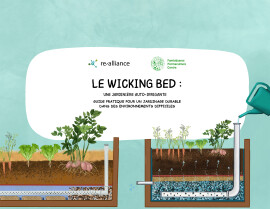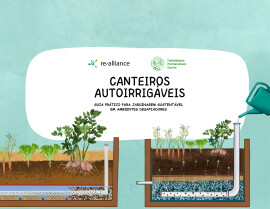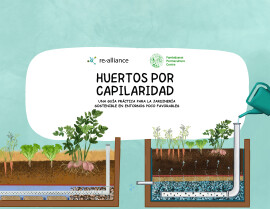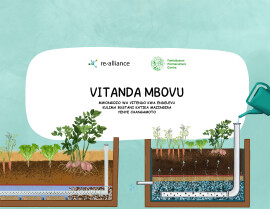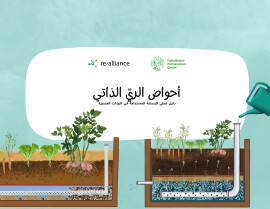
Farmer-led Extension
Concepts and practices
This is the first book to focus on farmer-led extension, drawing on the experiences of over 70 farmers, community workers, NGO staff, researchers and policy makers from throughout the world. A range of approaches to extension are discussed which include the campesino-a-campesino movement in South East Asia, 'problem census' approaches in South Asia, and information facilitation programmes in Africa.
Published: 1997
Pages: 224
eBook: 9781780444949
Paperback: 9781853394171
| ACKNOWLEDGEMENTS | |||
|---|---|---|---|
| ABBREVIATIONS | |||
| TABLES AND FIGURES | |||
| 1. Introduction | |||
| The farmer-led extension workshop | |||
| What is farmer-led extension? | |||
| Actors in farmer-led extension | |||
| The remainder of the book | |||
| 2. Challenges to agricultural extension in the twenty-first century | |||
| The changing global scene | |||
| The challenge to agriculture | |||
| Challenges for extension | |||
| 3. Extension experiences in agriculture and natural resource | |||
| management in the 1980s and 1990s | |||
| Introduction | |||
| Changing concepts and practice | |||
| Disenchantment with the public sector | |||
| Natural resource management and 'sustainability' | |||
| Issues | |||
| Looking ahead | |||
| 4. Origins and examples of farmer-to-farmer extension | |||
| Latin America | |||
| Indonesia | |||
| India | |||
| Philippines | |||
| Vietnam | |||
| 5. Principles and methods in farmer-to-farmer extension | |||
| Latin America | |||
| Indonesia | |||
| Philippines | |||
| Viemam | |||
| Nepal | |||
| Summary | |||
| 6. Roles and responsibilities in farmer-to-farmer extension | |||
| Farmer-extensionists | |||
| Extension workers and support agencies | |||
| 7. Issues and problems in farmer-to-farmer extension | |||
| Selection of farmer-extensionists | |||
| Payment and time allocation | |||
| Work location | |||
| Specialization | |||
| Gender issues | |||
| 8. Farmer field schools | |||
| Origins and principles | |||
| Methods and strategies | |||
| Role of professionals | |||
| Linking farmers | |||
| Links with research | |||
| Training of farmers and professionals | |||
| Selection of participants | |||
| Gender issues | |||
| 9. Problem censuslproblem solving | |||
| Nepal | |||
| Bangladesh | |||
| 10. NGO-government collaboration | |||
| Why are NGOs and government agencies willing to work together? | |||
| How do NGOs and government agencies work together? | |||
| Benefits fiom collaboration | |||
| Problems encountered in collaboration | |||
| Lessons learned fiom collaboration | |||
| 11. Other approaches to farmer-led extension | |||
| Supporting farmers' research | |||
| Limiting inputs to facilitation only | |||
| Helping farmers to access information | |||
| Combining institution-based training and farmer-led extension | |||
| Provision of fee-based service paid by farmers | |||
| 12. Impact assessment and evaluation | |||
| Individual or household-level assessment | |||
| Project-level assessment | |||
| Regional or national-level assessment | |||
| How to monitor, evaluate, and measure impact? | |||
| Indicators for assessing farmer-led extension | |||
| 13. Reaching more farmers | |||
| Scaling up | |||
| Scaling out | |||
| Constraints and positive influences | |||
| Environmental factors | |||
| Factors internal to the extension system | |||
| Factors internal to the community | |||
| Factors common to the extension system and the community . | |||
| 14. Lessons and conclusions | |||
| Categorizing the experiences | |||
| Prospects for expansion | |||
| Appendix 1: Workshop participants | |||
| Workshop organizers | |||
| Participants | |||
| Appendix 2: Papers cited and summarized | |||
| REFERENCES |
Investing in people: The support of farmer learning, creativity and local social networks in the Project Pisciculture Familiale, Zaïre
Simpson, B.M.
The Journal of Agricultural Education and Extension, Vol. 5 (1998), Iss. 2 P.99
https://doi.org/10.1080/13892249885300221 [Citations: 1]Scaling-up Sustainable Land Management Practices through the Concept of the Rural Resource Centre: Reconciling Farmers' Interests with Research Agendas
Bertin, Takoutsing
Zacharie, Tchoundjeu
Ann, Degrande
Ebenezar, Asaah
Alain, Tsobeng
The Journal of Agricultural Education and Extension, Vol. 20 (2014), Iss. 5 P.463
https://doi.org/10.1080/1389224X.2014.913984 [Citations: 17]Development of Farmer Field School methodology for smallholder dairy farmers in Kenya
Minjauw, B.
Muriuki, H.G.
Romney, D.
BSAP Occasional Publication, Vol. 33 (2004), Iss. P.299
https://doi.org/10.1017/S1463981500041820 [Citations: 2]Facilitating the wider use of agroforestry for development in southern Africa
Böhringer, Andreas
Development in Practice, Vol. 11 (2001), Iss. 4 P.434
https://doi.org/10.1080/09614520120066729 [Citations: 13]Developing Sustainable Farmer-led Extension Groups: Lessons from a Bangladeshi Case Study
Islam, Md. Mofakkarul
Gray, David
Reid, Janet
Kemp, Peter
The Journal of Agricultural Education and Extension, Vol. 17 (2011), Iss. 5 P.425
https://doi.org/10.1080/1389224X.2011.596658 [Citations: 24]Looking back to see ahead: Farmer lessons and recommendations after 15 years of innovation and leadership in Güinope, Honduras
Sherwood, Stephen
Larrea, Sergio
Agriculture and Human Values, Vol. 18 (2001), Iss. 2 P.195
https://doi.org/10.1023/A:1011179710081 [Citations: 12]The perceived effectiveness of agricultural technology transfer methods: Evidence from rice farmers in Northern Ghana
Azumah, Shaibu Baanni
Donkoh, Samuel A.
Awuni, Joseph A.
Yildiz, Fatih
Cogent Food & Agriculture, Vol. 4 (2018), Iss. 1 P.1503798
https://doi.org/10.1080/23311932.2018.1503798 [Citations: 32]Identities, interests, and preferences matter: Fostering sustainable community development by building assets and agency in western Kenya
Fuchs, Lisa Elena
Peters, Brianne
Neufeldt, Henry
Sustainable Development, Vol. 27 (2019), Iss. 4 P.704
https://doi.org/10.1002/sd.1934 [Citations: 14]The experiential learning cycle and its application towards the transformation of governmental extension services in sub-Saharan Africa
Percy, Rachel
International Journal of Lifelong Education, Vol. 18 (1999), Iss. 5 P.370
https://doi.org/10.1080/026013799293612 [Citations: 9]Local innovation in a global context: documenting farmer initiatives in land husbandry through WOCAT
Critchley, W. R. S.
Mutunga, K.
Land Degradation & Development, Vol. 14 (2003), Iss. 1 P.143
https://doi.org/10.1002/ldr.537 [Citations: 14]Potentials and constraints of the farmer‐to‐farmer programme for environmental protection in Nicaragua
Hawkesworth, S.
García Pérez, J. D.
Land Degradation & Development, Vol. 14 (2003), Iss. 2 P.175
https://doi.org/10.1002/ldr.546 [Citations: 10]The State of Agricultural Extension: An Overview and New Caveats for the Future
Benson, Amanda
Jafry, Tahseen
The Journal of Agricultural Education and Extension, Vol. 19 (2013), Iss. 4 P.381
https://doi.org/10.1080/1389224X.2013.808502 [Citations: 41]Stakeholder planning of the institutionalization of the volunteer farmer-trainer approach in dairy producer organizations in Kenya: key steps and supporting mechanisms
Kiptot, Evelyne
Franzel, Steven
International Journal of Agricultural Sustainability, Vol. 17 (2019), Iss. 1 P.18
https://doi.org/10.1080/14735903.2018.1558581 [Citations: 6]Farmer-participatory evaluation of cowpea integrated pest management (IPM) technologies in Eastern Uganda
Nabirye, J
Nampala, P
Ogenga-Latigo, M.W
Kyamanywa, S
Wilson, H
Odeke, V
Iceduna, C
Adipala, E
Crop Protection, Vol. 22 (2003), Iss. 1 P.31
https://doi.org/10.1016/S0261-2194(02)00094-7 [Citations: 21]Communication for Rural Innovation
References
2004
https://doi.org/10.1002/9780470995235.refs [Citations: 0]Social capital and geography of learning: Roles in accelerating the spread of integrated pest management
Palis, Florencia G.
Morin, Stephen
Hossain, Mahabub
The Journal of Agricultural Education and Extension, Vol. 11 (2005), Iss. 1-4 P.27
https://doi.org/10.1080/13892240585300051 [Citations: 11]Enhancing the role of rural agricultural extension programs in poverty alleviation: A review
Maulu, Sahya
Hasimuna, Oliver Jolezya
Mutale, Bornwell
Mphande, Joseph
Siankwilimba, Enock
Yildiz, Fatih
Cogent Food & Agriculture, Vol. 7 (2021), Iss. 1
https://doi.org/10.1080/23311932.2021.1886663 [Citations: 70]Comparative Study of Agricultural Extension Systems
Azadi, Hossein
Filson, Glen
Outlook on Agriculture, Vol. 38 (2009), Iss. 4 P.337
https://doi.org/10.5367/000000009790422133 [Citations: 14]Reorienting agricultural extension curricula in India
Sulaiman V, Rasheed
van den Ban, Anne W.
The Journal of Agricultural Education and Extension, Vol. 7 (2000), Iss. 2 P.69
https://doi.org/10.1080/13892240008438808 [Citations: 3]Participatory Epidemiology: Principles, Practice, Utility, and Lessons Learnt
Alders, Robyn G.
Ali, Syed Noman
Ameri, Aluma Araba
Bagnol, Brigitte
Cooper, Tarni L.
Gozali, Ahmad
Hidayat, M. M.
Rukambile, Elpidius
Wong, Johanna T.
Catley, Andrew
Frontiers in Veterinary Science, Vol. 7 (2020), Iss.
https://doi.org/10.3389/fvets.2020.532763 [Citations: 32]Farmer field school and banana xanthomonas wilt management: A study of banana farmers in four villages in Siaya County, Kenya
Dennis, Ochola
Wellington, Jogo
William, Tinzaara
Michael, Odongo
Margaret, Onyango
Eldad, Karamura
Journal of Agricultural Extension and Rural Development, Vol. 7 (2015), Iss. 12 P.311
https://doi.org/10.5897/JAERD2015.0737 [Citations: 3]The use and abuse of the ‘model farmer’ approach in agricultural extension in Ethiopia
Hailemichael, Selam
Haug, Ruth
The Journal of Agricultural Education and Extension, Vol. 26 (2020), Iss. 5 P.465
https://doi.org/10.1080/1389224X.2020.1757475 [Citations: 28]Mechanisms of Innovation Diffusion Under Information Abundance and Information Scarcity—On the Contribution of Social Networks in Group Vs. Individual Extension Approaches in Semi-Arid Kenya
Darr, Dietrich
Pretzsch, Jürgen
The Journal of Agricultural Education and Extension, Vol. 14 (2008), Iss. 3 P.231
https://doi.org/10.1080/13892240802207676 [Citations: 19]Ecological Aquaculture
Farming Systems Research and Extension Methods for the Development of Sustainable Aquaculture Ecosystems
Costa‐Pierce, Barry A.
2002
https://doi.org/10.1002/9780470995051.ch5 [Citations: 13]Impact of agricultural extension services on rice productivity and profitability in Bangladesh
Alam, Mohammad Jahangir
Sarma, Paresh Kumar
Begum, Ismat Ara
Crase, Lin
Tama, Riffat Ara Zannat
Kader, Md. Abdul
Outlook on Agriculture, Vol. 53 (2024), Iss. 4 P.376
https://doi.org/10.1177/00307270241296884 [Citations: 4]
